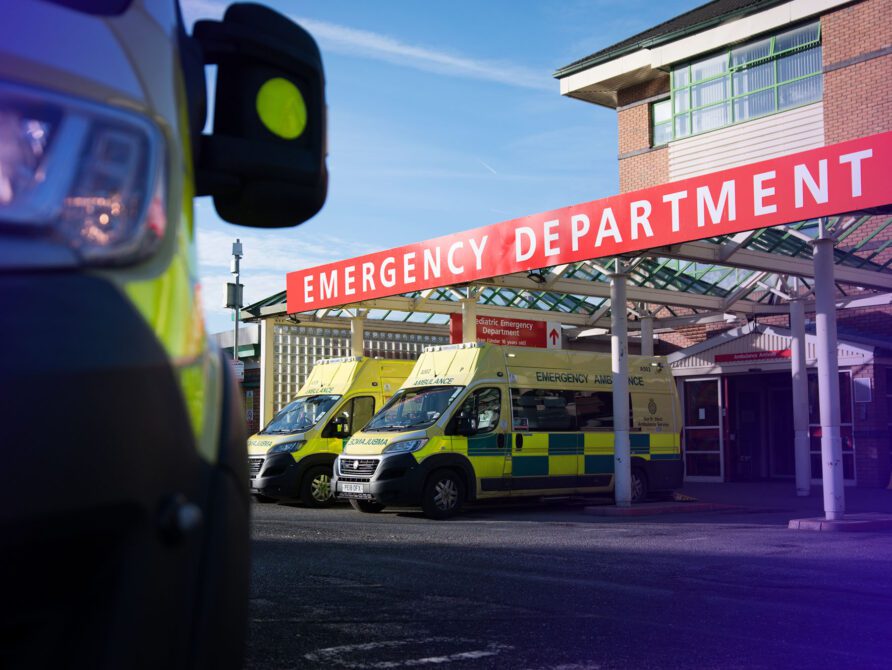INSIGHTS
Liverpool Heart and Chest Hospital (LHCH) offers world-class heart and
chest services with a commitment to deliver excellent, compassionate
and safe care for every patient, every day. This patient-centered
approach guides every aspect of the organisation, including its efforts
to advance digital maturity.
With a steadfast focus on patient safety, LHCH clinicians shape electronic
patient record (EPR) and digitisation initiatives. They use technology to reduce risk, improve efficiency and deliver the highest quality care. LHCH is currently top in the country according to results in the national NHS Staff Survey 2022 and one of the top three NHS organisations in the country for “Care is Our Top Priority” and being “A Place for Treatment” consistently performing amongst the highest performing trusts.
Nearly 100% paperless
Nearly all clinical information is captured electronically, which will save an estimated £100,000 over 10 years
Top-rated for digital maturity
Became the first trust in Europe to be assessed against the new and more extensive Stage 7 HIMSS standards
Ranked first by patients
Top in the country according to Care Quality Commission’s National Inpatient Survey, earned nine times in the past 14 years
Keys to EPR success: Clinical leadership and a trusted technology partner
In 2010, LHCH set a goal to be the premier, integrated cardiothoracic
organisation in the country. Its commitment to lead and deliver outstanding
care and research has helped LHCH become a top-performing Trust in the
country for overall patient experience in the Care Quality Commission’s
National Inpatient Survey for nine out of the past 12 years.
Technology plays an important role in this vision, and LHCH understands the
importance of clinical leadership for its EPR transformation. Analysts on the
core EPR team were from clinical backgrounds and helped shape workflows
and procedures to best meet clinical needs.
The evolution of Liverpool Heart & Chests EPR hasn’t been about costs or
technology. Nor has it been an IT-led project in any sense of the word. It has
always been about identifying clinical needs and developing systems that
benefit patients.
Altera offered the capabilities and approach that was the best fit for LHCH.
Altera Sunrise EPR gave LHCH the flexibility and features to be the innovator
they wanted to be. Altera took a partnership approach which was a standout feature for the Trust.
Implementation began in 2012 and, because LHCH was one of the first UK sites to use Altera Sunrise, the project required extra effort. “Altera took the time to understand the different workflows we have in the UK and built a lot to make it an English solution,” EPR Manager Carol Moss said. “Even with all of that work, the implementation was on time and on budget.”
“Throughout our technology transformation, we haven’t been aiming at any recognitions; those are just byproducts of our aim to always improve clinically and be better in safety issues.”
Carol Moss
EPR Manager
Improving the cardiac rehab referral workflow
LHCH has used the flexibility within Altera Sunrise to address clinical and
technical challenges, such as duplication in the cardiac rehabilitation referral
workflow. Cardiac rehab—including supervised exercise, counseling, and education—can help patients improve cardiovascular health after an acute episode. A timely, accurate referral from LHCH to an appropriate cardiac rehab location is an important part of a smooth transition for patients.
Previously, the EPR was separate from the referral system and required double entry of multiple fields within the workflow. “We developed an EPR form that automatically pulls information from previous places where it has been recorded, reducing the number of fields from 15 down to three,” Moss said. “When the patient is discharged, we have logic in the background that matches patient information to a Cardiac Rehabilitation location, which improves the accuracy of these referrals.”
Missed referrals have decreased drastically from an average of 50 to just one or two overall each month, resulting in most referrals going to the right place the first time.
LHCH used this pilot program as a template to extend the same technical
solution to other referral systems. For example, Community Heart Failure Team, District Nurses and Community Anticoagulation management.
An elite group of acute hospitals
LHCH have now joined an elite group of hospitals around the world who
have successfully validated against the HIMSS (Healthcare Information and
Management Systems Society) international Electronic Medical Record
Adoption Model (EMRAM) Stage 7 standards.
Validation at Level 7 affirms LHCH’s attainment of the highest international
quality standard, ensuring excellence in digital and data management to
support exceptional patient care and services.
LHCH’s progress towards achieving the highest levels of digital maturity
and being award this status was underpinned by the introduction of Closed
Loop Medication Administration (CLMA) processes in October 2021. This
built on existing electronic prescribing and medicines administration (ePMA)
functionality that was introduced in 2013 with the aim of further enhancing
patient safety by reducing medication administration errors, which are the
leading cause of avoidable harm in healthcare.
Improving patient safety with closed loop medication administration
LHCH introduced a closed loop administration process, using barcode
technology to positively identify the patient and validate against the
medication and prescription. This process is now in use for all oral medications, across all inpatient wards and critical care. Moss said this puts them “ahead of the curve”. Since introducing Sunrise KBMA, the trust has been able to reduce medication administration errors by 55%.
“We were the first Altera Digital health customer to go live with this
functionality in Sunrise. Being able to do it in a complex environment like
critical care without any major issues is a testament to how motivated
our multidisciplinary teams are to embrace change and improve patient
experience.”
Achieving a nearly 100% paperless system
The National Health Service (NHS) describes a vision for the future of
healthcare that acknowledges the benefits of a paperless system. A crucial goal for NHS England is for all all trusts to become paperless to enable better health and care at a lower cost. LHCH embraced these principles in the earliest days of launching its EPR.
“From go-live, our aim was to put all clinical information into electronic format, with only a very minimal amount captured on paper,” Moss said.
LHCH evaluated every paper-based process at the hospital and developed
a way to capture the same information electronically, using the Sunrise HIM
scanning solution delivered by Hyland OnBase, even for items such as patient
signatures.
“Now when patients are discharged, there is a small amount of paper from
diagnostic systems, which we scan and capture electronically,” Moss said. “In
the end, we are operationally nearly 100% paperless.”
Pre- go-live historic case notes totaled 133,000, with the remaining figure being 90,000, which are being reviewed with the appropriate files being destroyed delivering a minimum cost, saving more than £100,000 over 10 years.
Clinicians acknowledge benefits of EPR
In the early days of the transition, Moss remembered clinicians were concerned that the EPR made it more difficult to quickly document information. “But they realised that information is much easier to locate in an EPR, because it’s always in the same place, and that saves them time,” she said. “We have also enabled remote access, which makes it easier for clinicians to assess patients’ data from wherever they are, improving the response time to changes in a patient’s condition.”
“We were the first Altera Digital health customer to go live with this functionality in Sunrise. Being able to do it in a complex environment like critical care without any major issues is a testament to how motivated our multidisciplinary teams are to embrace change and improve patient experience.”
Carol Moss
EPR Manager
About the Client:
Liverpool Heart and Chest Hospital
In 2013, Liverpool Heart and Chest Hospital NHS Foundation Trust became one of the first trusts nationally to introduce Sunrise Electronic Patient Record (EPR). Since then, it has continued making strides in its digital journey: optimising and enhancing the EPR with documentation and tracking board enhancements and embedded decision support, integrating clinical systems, embedding information sharing across care services, and investing in digital infrastructure, cybersecurity and intelligence-led care.
In 2013, Liverpool Heart and Chest Hospital NHS Foundation Trust became one of the first trusts nationally to introduce Sunrise Electronic Patient Record (EPR). Since then, it has continued making strides in its digital journey: optimising and enhancing the EPR with documentation and tracking board enhancements and embedded decision support, integrating clinical systems, embedding information sharing across care services, and investing in digital infrastructure, cybersecurity and intelligence-led care.
Related Insights
Article
Client Story
Article
Article
Article
Article
Article
Working smarter: Virtual medical assistants on the up and up
Jeanne Armstrong, M.D.
Article
Article
Article
Article
Does your EHR truly support behavioral health providers?
Dr. Mark Pratt
Client Story
Leading the way: Reducing police callouts and prioritising patient safety at Bolton NHS Foundation Trust
Bolton NHS Foundation Trust












